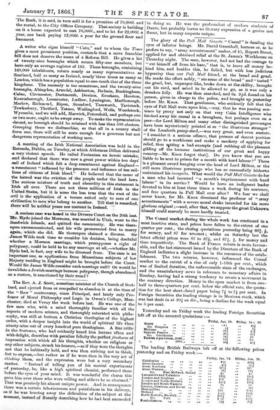The Rev. A. Scott, sometime minister of the Church of
Scot- land, and ejected from or compelled to abandon it at the time of -the " Row " controversy, since Principal, and lately only Pro- fessor of Moral Philosophy and Logic in Owen's College, Man- -cheater, died at Vevey the week before last. He was one of the few men who, with a mind thoroughly familiar with all the aspects of modern science, and thoroughly saturated with philo- sophy, was still at bottom a Christian theologian of the highest -order, with a deeper insight into the world pf spiritual life than ninety-nine out of every hundred pure theologians. A fine critic in the Scotsman, who had evidently- heard him lecture Dftezi and with delight, describes with peculiar felicity the perfect freshness of impression with which all his thoughts, whether on religious or any other subjects, struck his hearers, —as if they Were the thotiglits atot that he habitually held, and was then striving not to think, -but to express,—but rather as if he were then in the very act of -thinking them, and the expression were but a very secondary matter. " Instead of telling you of his mental experiments -of yesterday, he, like a high spiritual chemist, performed them 'before the eyes of your mind. It was wonderful the charm this gave him over those who were willing and able to be so charmed." That was precisely his almost unique power. And in consequence there was a certain laboriousness and painfulness in his delivery, cs if he was heaving away the difficulties of the subject at the moment, instead of fluently describing how he had best succeeded
in doing so. He was the profoundest of modern students of Dante, but probably leaves no litarary expression of a genius not fluent, but in many respects unique.


































 Previous page
Previous page